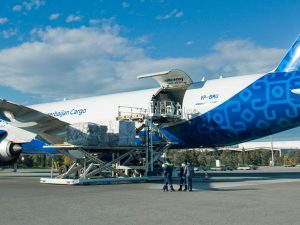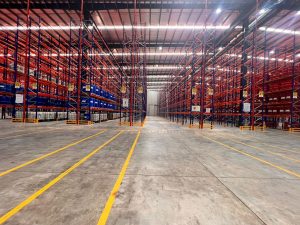Hyderabad is set to welcome industry leaders, innovators and solution providers for the Cold Chain Unbroken event, a premier platform dedicated to the future of temperature-controlled logistics, set to be held on 18-19 September 2025. Bringing together stakeholders from pharma, perishables, air cargo, warehousing and technology, the event will focus on strengthening cold chain infrastructure, enhancing efficiency and ensuring compliance with global quality standards. For air cargo and logistics professionals, it promises valuable insights, networking and opportunities to explore cutting-edge solutions that are shaping the future of end-to-end cold chain management.
Read More »Global cargo giants to take center stage in Central Asia
The countdown has begun. In just a week, the heart of Eurasia will host the Central Asia Air Cargo Summit 2 the region’s flagship platform for strategy, infrastructure, investment and innovation in air freight, from 22 till 25 September, 2025. As Central Asia emerges as a key global cargo hub, the summit will bring together over 30 airlines, top logistics players, regulators and technology providers to shape the future of regional and transcontinental connectivity. Confirmed speakers include industry leaders such as Rizwan Siddiqui (IATA), Thomas Kowitzki (DHL Global Forwarding), Farhod Rahmonov (Turkish Airlines), Michael Clements (Atlas Air), Endzhe Gilfanutdinova (Lufthansa Cargo), Gerhard Coetzee (Chapman Freeborn), Nurbek Bekmukhambetov (Vietjet Qazaqstan), Joyce Tai (Freightos Group) and Parvinder Singh (Hans Infomatic), alongside representatives from UzCargo, Navoi Airport, Fly Khiva and more. Airlines participating include Uzbekistan Airways, Turkish Cargo, Alpha Sky, My Freighter, Qatar Airways, Lufthansa Cargo, Flydubai, SCAT Airlines, Vietjet Qazaqstan, Saudia Cargo, FedEx/TNT, and Silk Way West, among others — making this a truly unmissable networking and business development opportunity. Key sessions include: Digital Innovations in Air Cargo Air Cargo Infrastructure & Investment Air Cargo Industry Leaders Roundtable New Routes and Regional Development E-commerce and Express Delivery Logistics Multimodal Corridors and Trade Facilitation On-Site Experience Take part in a guided tour of Tashkent International Airport’s new cargo terminal, which has quadrupled its handling capacity and is setting new standards in efficiency and automation for the region. Business-Focused Networking This isn’t just a conference — it’s a powerful industry platform designed to foster new connections, unlock investment opportunities, and turn regional challenges into actionable growth strategies. Why You Should Join: Central Asia is not just a transit point anymore — it’s rapidly becoming …
Read More »‘Airlines may add freighters or use P2Fs on long-haul routes to meet demand’
Dilip Sahu, Director, EPS Worldwide Integrated Logistics said, “Airports are investing in express handling facilities, digitised customs clearance and 24/7 border operations to support faster turnaround times. Airlines and logistics providers are deploying more freighters and converting passenger aircraft to cargo use, especially on long-haul routes to Europe and North America. Predictive analytics, real-time tracking and automated sorting systems are becoming standard to meet the precision required for time-definite deliveries. Countries and companies that streamline express logistics will gain a trade edge. The speed of express delivery often comes at a carbon cost. The industry is exploring greener aircraft, optimised routing and multimodal integration to balance speed with sustainability.”
Read More »‘There has been rise of investments from public & private sectors in express logistics biz’
Afzal Malbarwala, Managing Director, Galaxy Freight said, “The focus is now on fast shipping to minimise risks, particularly for high-value items such as pharmaceuticals, electronics and project cargo including heavy machinery and massive industrial equipment. Additionally, the demand for express air cargo skyrocketed with the surge in demand for high-value goods with their original composition and quality intact, an increase in online shopping (e-commerce) and a just-in-time inventory management strategy — all of which became megatrends during the COVID-19 pandemic. As a result, there has been a surge of investments from both the public and private sectors, improving the logistics ecosystem and making it more sustainable.”
Read More »‘Today, customers expect instant fulfilment with rise in express deliveries’
Amit Maheshwari, Founder and CEO, Softlink Global said, “Traditional cargo flows were often planned weeks in advance, but today, customers expect instant fulfilment. This shift is compelling airlines, freight forwarders and technology providers to invest in smarter networks, digital booking platforms and AI-driven route planning. Express cargo is no longer just about speed — it’s about reliability, predictability and visibility. Airlines are rethinking fleet utilisation, dedicating narrow-body freighters for regional express flows and adopting real-time tracking technologies. For the industry, this means higher yields compared to general cargo, but also higher expectations on service levels. In short, time-definite logistics is becoming the growth engine that will push air cargo into a more agile, tech-enabled future.”
Read More »‘Need for speed & reliability has intensified with express biz growing’
Keku Bomi Gazder, CEO & MD, Aviapro Logistic Services said, “As e-commerce, healthcare logistics and high-value manufacturing sectors continue to expand, the need for speed and reliability in shipments has intensified. Consumers and businesses alike now expect faster delivery timelines, often within 24 to 72 hours, fuelling a surge in express air freight services. This demand is prompting cargo airlines and logistics providers to invest in dedicated freighter fleets, advanced tracking technologies and expanded hub-and-spoke networks to enhance service efficiency and visibility. Major integrators are expanding their global air networks, while traditional carriers are increasingly converting passenger aircraft for cargo use to meet short-term spikes. Additionally, digitalisation and automation in cargo handling are being accelerated to reduce turnaround times and ensure timely deliveries. Emerging markets, particularly in Asia-Pacific and Africa, are also contributing to growth, driven by cross-border e-commerce. Overall, time-definite delivery demand is shifting air cargo from a supplementary mode to a critical component of global supply chains. This evolution is positioning the industry for sustained growth, particularly in segments requiring speed, precision and reliability, such as pharmaceuticals, electronics and high-end retail.”
Read More »Om Logistics, GLA University ink pact to upskill logistics aspirants
In a landmark step toward bridging academics with real-world expertise, Om Logistics Supply Chain has signed MoU with GLA University on 25 August 2025. The collaboration is set to open new doors of opportunity for students aspiring to build careers in logistics and supply chain management. As part of the agreement, above 300-hour intensive program has been launched exclusively for MBA students. The course blends theoretical knowledge with hands-on exposure, equipping students with the right skills and mindset to succeed in the logistics sector. With this, Om Logistics Supply Chain becomes the first logistics company to introduce such an in-depth program dedicated to building the next generation of leaders. Together, the company and university both will focus on preparing industry-ready professionals to meet the evolving demands of the logistics ecosystem.
Read More »Silk Way West Airlines secures ISO 14001 environmental certification
Silk Way West Airlines has been awarded the ISO 14001 Environmental Management System (EMS) certification by the Quality Consulting Services (QCS), marking a key milestone in the airline’s journey toward greater environmental responsibility. The internationally recognised certification confirms the airline’s commitment to reducing its environmental impact through improved resource efficiency, pollution control, and climate-conscious operations. “This achievement enhances our business reputation and reflects our commitment to building strong, trust-based relationships with our customers, partners, and regulators,” said Wolfgang Meier, President of Silk Way West Airlines. The implementation of ISO 14001 strengthens Silk Way West Airlines’ ability to meet regulatory standards, drive operational efficiency, and embed a culture of sustainability across the organisation. Building on this success, the airline plans to deepen its environmental strategy by launching internal sustainability programs, providing staff training, and pursuing further certifications such as ISO 50001 for energy management, as well as participating in global reporting frameworks such as the GRI.
Read More »Allcargo Supply Chain unveils MMLP in Panapakkam, Chennai
Allcargo Supply Chain, part of Allcargo Logistics has announced the launch of its logistics park in Panapakkam, near Chennai. Spread across 2.75 lakh sq ft of Grade A warehousing space, the facility marks a significant expansion of the company’s southern network and reinforces its strategy of infrastructure-driven growth. Strategically located at the intersection of NH 76 and SH 50, the Panapakkam Logistics Park offers smooth access to Red Hills, Chennai Port, Sri City, Sriperumbudur and Oragadam, positioning it as a vital multi-modal hub for pan-India distribution. The facility also marks a significant step in diversifying Allcargo Supply Chain’s business in the southern zone, with sector focus anchored by around 50% automobile, supported by e-commerce and consumer durables.
Read More »‘Taxation, licensing & evolving policies can be challenging’
Abhishek Goyal, CEO& ED, Aeroprime Group said, “Emerging markets present tremendous opportunities but also come with unique regulatory and operational complexities. In India, taxation, licensing and evolving aviation and air cargo policies can be challenging. Southeast Asia’s diversity means that each market comes with its own regulatory framework, requiring highly tailored approaches. Africa, while full of promise with its expanding trade lanes, continues to face challenges such as infrastructure bottlenecks, limited digital penetration and currency convertibility issues. For GSSAs, the key is to remain compliant, build strong local networks and adapt flexibly to these conditions while still delivering globally consistent service quality for their airline partners. It is equally important to build a strong pipeline that ensures smooth cargo flow, maintain market presence and visibility and establish stable operations backed by exceptional customer service.”
Read More » Cargo Breaking News
Cargo Breaking News


